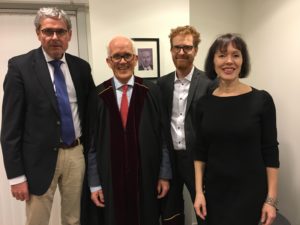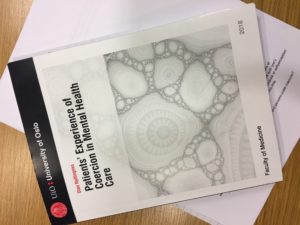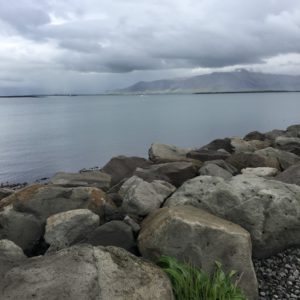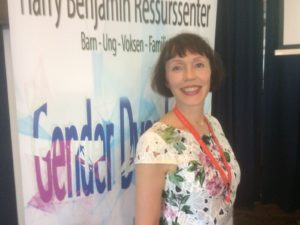Finally holidays, and after some day out of office my hospital email is already full and I cannot use it with the mobile phone. This is a much needed break!

The end of the spring term was most inspiring for me. First I acted as opponent to Olav Nyttingnes who defended his doctoral thesis on patients’ experiences of coercion in psychiatric treatment in University of Oslo. This task was very interesting to me as I have also written my academic dissertation on patients’ experiences on involuntary psychiatric treatment. I have done quite a lot of research on coercion in psychiatry, first among working aged patients and later among adolescents. Therefore, I found Olav’s thesis particularly interesting. He made a valuable contribution to the field by creating a scale for measuring patients’ experiences of coercion that is suitable across settings and among patients of different ages. I think we had a most pleasurable scientific discussion, and I was also pleased to observe that the results of my thesis had not been outdated but later scholars have been able to build on them and develop some ideas further. I informed colleagues in our hospital about Olav Nyttingnes’ work, and we have a great interest in using the new scale in our service development as soon as possible.

I returned to Oslo very soon, to a meeting with a very different topic: I lectured in a child and adolescent gender identity seminar organized by the Harry Benjamin Resource Center (http://www.hbrs.no/). I and my colleagues had recently published a review on gender dysporia / transgender identity and adolescent development, and this was also the topic of my lecture. There is a great increase of adolescents experiencing gender dysphoria across Western countries, and the reasons for such sudden increase of particularly biological girls seeking gender reassignment are not known. Our article is open access and can be seen here https://www.dovepress.com/gender-dysphoria-in-adolescence-current-perspectives-peer-reviewed-article-AHMT
Thereafter I had a most pleasurable opportunity to welcome six (!) medical students who came to work in our clinic in Tampere University Hospital as assistants. (Given the size of our clinic, this is many!) Four of them had a clinical position and two did scientific work. What wonderful young future colleagues! We had a little extra course on adolescent psychiatry before they started working. Being a teaching hospital is a constant challenge: we have to be able to effectively explain the essence of our work, and to convince the future colleagues of why our work is important and necessary. This keeps us awake, of course. Psychiatry is fascinating, and adolescence with all its opportunities is the most fascinating developmental period. I hope we were able to pass even a little of this to these assistants, and to all the future professionals – in medicine, nursing, psychology , social work, occupational therapy – who train in our clinic.
Finally I had the opportunity to attend two congresses, the Nordic Congress of Psychiatry and the EFCAP (www.efcap.org). It is fascinating, although sometimes also hard, to observe how fiction processes topics familiar to me from clinical and scientific work. In the Nordic congress, professor Nina Lindberg and I discussed school shooting rampages in fiction and scientific research. Of the three books, which I also mention in Books I recommend, I liked most the Nineteen minutes by Jodi Picoult. Altogether, Nineteen minutes, Störst av allt and We need to talk about Kevin actually cover quite well the topics discussed in scientific study. In the EFCAP, Dr Svetlana Oshukova and I focused on another literary topic, related to Harry Potter, but as we have further plans I don’t tell more now…

